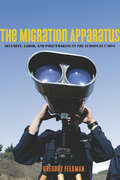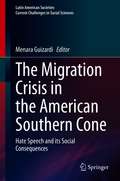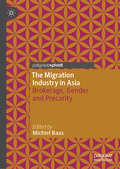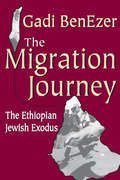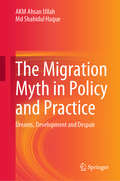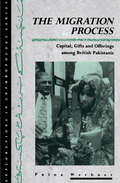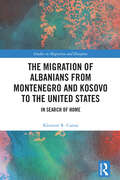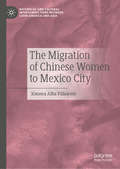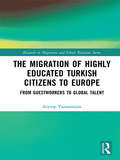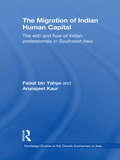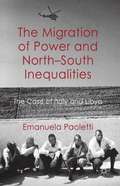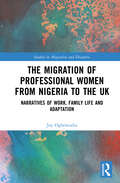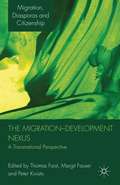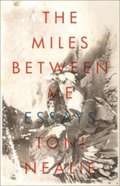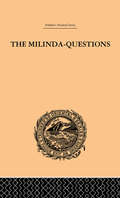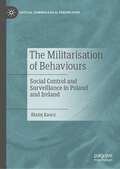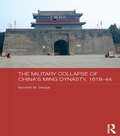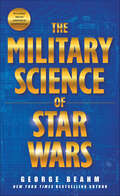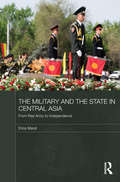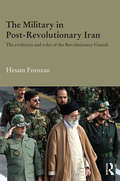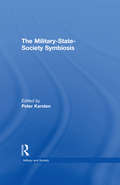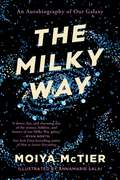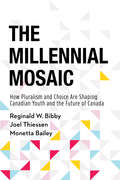- Table View
- List View
The Migration Apparatus: Security, Labor, and Policymaking in the European Union
by Gregory FeldmanEvery year, millions of people from around the world grapple with the European Union's emerging migration management apparatus. Through border controls, biometric information technology, and circular migration programs, this amorphous system combines a whirlwind of disparate policies. The Migration Apparatusexamines the daily practices of migration policy officials as they attempt to harmonize legal channels for labor migrants while simultaneously cracking down on illegal migration. Working in the crosshairs of debates surrounding national security and labor, officials have limited individual influence, few ties to each other, and no serious contact with the people whose movements they regulate. As Feldman reveals, this complex construction creates a world of indirect human relations that enables the violence of social indifference as much as the targeted brutality of collective hatred. Employing an innovative "nonlocal" ethnographic methodology, Feldman illuminates the danger of allowing indifference to govern how we regulate population-and people's lives-in the world today.
The Migration Crisis in the American Southern Cone: Hate Speech and its Social Consequences (Latin American Societies)
by Menara GuizardiThis book analyzes how the increase in migration from other Latin American countries to countries of the American Southern Cone such as Brazil, Argentina and Chile has generated a crisis fueled by the emergence of hate discourses towards migrant populations. While extracontinental migration to Europe, North America and elsewhere has waned over the last decades, migration between Latin American countries has increased dramatically as a product of the differential development of the region’s economies, violence, and political turmoil. This book sets out to explain the effects of these trends by analyzing statistical data, official documents and ethnographic material gathered over a long period of research carried out throughout South America. The volume is divided in two parts. In the first part, it presents a theoretical contribution, synthesizing particularities of intraregional migration in Latin America, as well as the emergence of hate discourses towards migrant populations, developing approaches oriented towards a critical gender perspective. It also underlines important contributions that Latin American migration studies can make to current debates about migration across the globe. In the second part, it presents case studies dedicated to Argentina, Brazil and Chile. The Migration Crisis in the American Southern Cone: Hate Speech and its Social Consequences will be a valuable resource to migration studies researchers by presenting fresh theoretical and empirical contributions to the field from a Latin American perspective.
The Migration Industry in Asia: Brokerage, Gender and Precarity
by Michiel BaasThis pivot considers the emergence and functioning of the migration industry and commercialization of migration pathways in Asia. Grounded in extensive fieldwork and building on empirical data gathered through interactions and interviews with brokers, agents and other facilitators of migration, it examines the increasing co-dependence on, entanglement of and overlap between migrants, industry and state. It considers how for low-skilled migrants, migration is often not even possible without the involvement of the industry. As the opportunity to migrate has opened up to an ever-widening group of potential migrants, receiving nations have fine-tuned their migration infrastructure and programs to facilitate the inflow (and timely outflow) of the migrants it deems desirable. The migration industry plays an active role as mediator between migrants’ desires and states' requirements. This pivot focuses on what unites sending and receiving sides of migration, going beyond presupposed established networks, and offering a clear conceptualization of the contemporary migration industry in Asia.
The Migration Journey: The Ethiopian Jewish Exodus (Memory And Narrative Ser. #31)
by Stephen MillerBetween 1977 and 1985, some 20,000 Ethiopian Jews left their homes in Ethiopia and embarked on a secret and highly traumatic exodus to Israel. Due to various political circumstances they had to leave their homes in haste, go a long way on foot through unknown country, and stay for a period of one or two years in refugee camps, until they were brought to Israel. The difficult conditions of the journey included racial tensions, attacks by bandits, night travel over mountains, incarceration, illness, and death. A fifth of the group did not survive the journey.This interdisciplinary, ground-breaking book focuses on the experience of this journey, its meaning for the people who made it, and its relation to the initial encounter with Israeli society. The author argues that powerful processes occur on such journeys that affect the individual and community in life-changing ways, including their initial encounter with and adaptation to their new society. Analyzing the psychosocial impact of the journey, he examines the relations between coping and meaning, trauma and culture, and discusses personal development and growth.
The Migration Myth in Policy and Practice: Dreams, Development and Despair
by AKM Ahsan Ullah Md Shahidul HaqueThis book investigates the long-term impact of migration on development, engaging in a thorough analysis of the pertinent factors in migration. Migration scholars and stakeholders have long placed emphasis on the necessity of migration for development. At the heart of this book is the question: Has migration made development necessary, or is it the other way around? While existing literature is predominantly occupied with positive impressions about the migration-development nexus, this book challenges associated pervasive generalizations about the impact of migration, indicating that migration has not impacted all regions equally. This volume thus grapples with the different extents to which migration has impacted development by delving into the social costs that migrants often pay in the long run. With empirical support, this book proffers that some countries are becoming over-dependent on migration. A excellent resource for both policymakers working on migration policy, and scholars in international relations, migration and development studies, this book presents a range of innovative ideas in relation to the remittance-development nexus.
The Migration Process: Capital, Gifts and Offerings among British Pakistanis (Explorations in Anthropology)
by Pnina WerbnerThis study, which breaks new ground in urban research, is a comprehensive and definitive account of one of the many communities of South Asians to emerge throughout the Western industrial world since the Second World War - the British Pakistanis in Manchester. This book examines the cultural dimensions of immigrant entrepreneurship and the formation of an ethnic enclave community, and explores the structure and theory of urban ritual and its place within the immigrant gift economy.
The Migration of Albanians from Montenegro and Kosovo to the United States: In Search of Home (ISSN)
by Klement R. CamajThis book examines the ways in which Albanian men, women, and families who have migrated from Montenegro and Kosovo to the United States understand and make sense of their mobility and settlement.Drawing on empirical research, including interview material, it goes beyond the experiences of individual migrants to explore the role that cultural identity has in shaping their mobility and immobility, with particular attention to the manner in which subjects talk about their experiences in terms of past and present movements and moments.An original storytelling study of the meaning, scope, and outcomes of mobility, and the construction of home and identity on the part of migrants, this title will appeal to scholars of sociology, geography, anthropology, and politics with interests in migration and diaspora.
The Migration of Chinese Women to Mexico City (Historical and Cultural Interconnections between Latin America and Asia)
by Ximena Alba VillaleverThis book focuses on the migration strategies of Chinese women who travel to Mexico City in search of opportunities and survival. Specifically, it explores the experiences and contributions of women who have placed themselves within the local and conflictive networks of Mexico City´s downtown street markets (particularly in Tepito), where they work as suppliers and petty vendors of inexpensive products made in China (specifically in Yiwu). Street markets are the vital nodes of Mexican “popular” economy (economía popular), but the people that work and live among them have a long history of marginalization in relation to formal economic networks in Mexico City. Despite the difficult conditions of these spaces, in the last three decades they have become a new source of economic opportunities and labor market access for Chinese migrants, particularly for women. Through their commerce, these migrants have introduced new commodities and new trade dynamics into these markets, which are thereby transformed into alternative spaces of globalization.
The Migration of Highly Educated Turkish Citizens to Europe: From Guestworkers to Global Talent (Research in Migration and Ethnic Relations Series)
by Zeynep YanasmayanThe increasing global competition of knowledge economies has begun a new era of labour migration, as economies chase ‘the best and the brightest’: the movement of highly skilled workers. This book examines the experiences of highly educated migrants subjected to two distinct and incompatible public discourses: one that identifies them in terms of nationality and presupposed religion, and another that focuses on their education and employment status, which suggests that they deserve the best treatment from societies engaged in the global 'race for talent'. Presenting new empirical research collected in Amsterdam, Barcelona and London amongst highly educated migrants from Turkey, the author draws on their narratives to address the question of whether such migrants should be apprehended any differently from their predecessors who moved to Europe as 'guestworkers' in the twentieth century. With attention to the reasons for which highly skilled workers choose to migrate and then stay (or not) in their 'host' countries, their connection to their multiple homes and the ways in which they meet the challenges of integration – in part by way of their position in relation to other migrants – and their acquisition of citizenship in the 'host' country, The Migration of Highly Educated Turkish Citizens to Europe offers insights on an under-researched trend in the field of migration. The author develops three nexuses – the mobility/migration nexus, the mobility/citizenship nexus, and the mobility/dwelling nexus – to account for the embedded sense of mobility that underlies these ‘new’ migrants and offers a holistic picture about their trajectory from ‘arrival to settlement’ and all that lies in-between. As such, it will appeal to scholars in the fields of sociology and political science with interests in migration and mobility, ethnicity and integration.
The Migration of Indian Human Capital: The Ebb and Flow of Indian Professionals in Southeast Asia (Routledge Studies in the Growth Economies of Asia)
by Faizal bin Yahya Arunajeet KaurIn an increasingly globalised world manifested in greater economic integration, human capital is an important factor. One of the key sources of human capital to the global economy is India, and the main destinations for Indian professionals has been Western developed economies, the Middle East and Gulf regions and East and Southeast Asia. Southeast Asia as a region has close historical, social and cultural linkages with India, and India has undertaken a number of initiatives under its "Look East" policy (LEP) to enhance ties with the Southeast Asian region. This book examines the trends and motivations of human capital flows from India into this region. Focusing in particular on Malaysia, Singapore, Indonesia and Thailand, the book provides an analysis of Indian labour in a variety of sectors, including information technology (IT) sector, academia, banking, oil and gas. Based on empirical data, the book provides an analysis of current trends in the flow of human capital from India to Southeast Asia. It will be of interest to policy makers, businessmen, students, analysts and academics in the field of Asian studies, foreign relations, human capital and labour migration.
The Migration of Power and North–South Inequalities: The Case of Italy and Libya
by Emanuela PaolettiThis book examines negotiations on migration in the Mediterranean. It argues that migration is a bargaining chip which countries in the South use to increase their leverage versus their counterparts in the North. This proposition opens up new understandings reframing relations of inequalities among states.
The Migration of Professional Women from Nigeria to the UK: Narratives of Work, Family Life and Adaptation (Studies in Migration and Diaspora)
by Joy OgbemudiaBased on interviews with women who were professionals in different fields in Nigeria prior to migrating, The Migration of Professional Women from Nigeria to the UK examines the ways in which professional, middle-class women make sense of their lived experiences, their roles in migration decision-making and their experiences of adaptation in the UK. Drawing on the thought of Mead on the symbolic reconstruction of the past from the standpoint of the present, and employing a feminist approach to qualitative research, the book considers the reflexive construction of women’s narratives concerning their lived experiences in Nigeria and sheds light on their decisions to migrate. Using intersectionality and critiquing the concept of "Strong Black Woman", the author analyses participants’ narratives of integration, adaptation, and work and family life in the UK. Rejecting the notion of "culture shock" as a means of explaining immigrants' early experiences, the use of a "person-by-situation" approach is proposed to accommodate the nuances of individual narratives. A rich, theoretically informed study of the narratives of skilled migrants, whose experiences are often subsumed into studies of "African" migration more broadly, this volume will appeal to scholars of sociology, anthropology and cultural geography with interests in migration, gender and the sociology of work and family life.
The Migration-Development Nexus
by Peter Kivisto Margit Fauser Thomas FaistThis book examines current policy discussions around the migration-development nexus and subjects them to rigorous conceptual and empirical criticism through a transnational lens, placing the current re-discovery of migrants as agents of development nexus into theoretical and historical perspective.
The Miles Between Me
by Toni NealieIn her debut essay collection, New Zealand native Toni Nealie examines journeys, homelands, family, and motherhood. She details humiliating confrontations with airport security, muses on the color brown, and intimately investigates her grandfather's complicated and criminal past, all while hearkening home--wherever and whatever that is. Toni Nealie is a writer, journalist, and teacher. Her work has appeared in Guernica, the Offing, the Rumpus, and the Prague Review. She worked in magazines, politics and public relations in the United Kingdom and her native New Zealand before moving to the United States--two weeks before 9/11.
The Milinda-Questions: An Inquiry into its Place in the History of Buddhism with a Theory as to its Author
by Mrs Rhys DavidsFirst Published in 2000. Routledge is an imprint of Taylor & Francis, an informa company.
The Militarisation of Behaviours: Social Control and Surveillance in Poland and Ireland (Critical Criminological Perspectives)
by Błażej KauczThis book examines how historical military influences can become embedded and used by the state to control citizens' behaviour, termed the militarisation of behaviours. It refers to the treatment of citizens by their state in a manner resembling the treatment of soldiers by the army. The militarisation of behaviours is a process of mass social control where the state exercises its powers over the population, blurring the boundaries between a dichotomous divide of civilian and military life. This book focuses on the social process of how Polish post-WWII emergency legislation was normalised and how through it the Polish communist state (from 1943/4 until 1989) introduced and enforced the process of militarisation of behaviours. It discusses the impact of the emergency legislation on the Republic of Ireland as a comparison. It offers a useful lens to understand the social and political processes happening currently in Poland, Ireland, and elsewhere, with the increasing influence of the (far) right. This book is situated in the framework of criminology and socio-legal studies.
The Militarization of Childhood
by J. Marshall BeierIn its various manifestations, the campaign to end child soldiering has brought graphic images of militarized children to popular consciousness. In the main, this has been a campaign that has seemed to speak to African contexts without as much reflection on the myriad ways in which the lives of children are militarized in advanced (post)industrial societies. Proceeding from this quite striking omission, the contributors to this volume move beyond the usual focus on the global South. Making what will be an important contribution to a much needed critical turn in the vast and still rapidly growing child soldier literature, they address multifarious ways in which childhood is militarized beyond the global South through enactments of militarism that have drawn much less in the way of critical inquiry.
The Military Collapse of China's Ming Dynasty, 1618-44 (Asian States and Empires)
by Kenneth M. SwopeThis book examines the military collapse of China’s Ming Dynasty to a combination of foreign and domestic foes. The Ming’s defeat was a highly surprising development, not least because as recently as in the 1590s the Ming had managed to defeat a Japanese force considered to be perhaps the most formidable of its day when the latter attempted to subjugate Korea en-route to a planned invasion of China. In contrast to conventional explanations for the Ming’s collapse, which focus upon political and socio-economic factors, this book shows how the military collapse of the Ming state was intimately connected to the deterioration of the personal relationship between the Ming throne and the military establishment that had served as the cornerstone of the Ming military renaissance of the previous decades. Moreover, it examines the broader process of the militarization of late Ming society as a whole to arrive at an understanding of how a state with such tremendous military resources and potential could be defeated by numerically and technologically inferior foes. It concludes with a consideration of the fall of the Ming in light of contemporary conflicts and regime changes around the globe, drawing attention to climatological factors and developments outside state control. Utilizing recently released archival materials, this book adds a much needed piece to the puzzle of the collapse of the Ming Dynasty in China.
The Military Science of Star Wars
by George BeahmGeorge Beahm, a former U.S. Army major, draws on his experience to discuss the military science of the sprawling Star Wars universe: its personnel, weapons, technology, tactics and strategy, including an analysis of its key battles to explain how the outmanned and outgunned rebels ultimately prevailed against overwhelming forces. Contrasting the military doctrine of the real world with the fictional world of Star Wars, the author constructively criticizes the military strengths and weaknesses of Darth Vader’s Galactic Empire and Kylo Ren’s First Order... From Star Wars: A New Hope (1977) to Rogue One (2016), this timely book demystifies the operational arts in an accessible and entertaining way for military personnel and civilians. Replete with a glossary of military terms, this book is supplemented with an annotated bibliography.At the Publisher's request, this title is being sold without Digital Rights Management Software (DRM) applied.
The Military and the State in Central Asia: From Red Army to Independence (Central Asian Studies)
by Erica MaratThe military played a pivotal role in the political development, state functions, foreign policy and the daily lives of the people in the Central Asian states from the early twentieth century until the present. This book is the first major, in-depth study of the military institutions in Central Asian states. It examines their hidden story, the different stages of their development from the early twentieth century until the present, and the influence they had on the state and society. It effectively combines history, sociology of the military and political science and provides deeper insights into how recently formed states function. By concentrating extensively on the military, this book is an important and a timely contribution to a wide range of disciplines including Central Asian studies, and post-colonial state and nation-building studies.
The Military in Post-Revolutionary Iran: The Evolution and Roles of the Revolutionary Guards (Durham Modern Middle East and Islamic World Series)
by Hesam ForozanIran's Revolutionary Guard Corps, also known as the 'Sepah', has wielded considerable and increasing power in Iran in recent decades. Established in 1979 by Ayatollah Khomeini as a paramilitary organisation charged with protecting the nascent Islamic regime and countering the untrustworthy Imperial army (or 'Artesh'), the Sepah has evolved into one of the most powerful political, ideological, military and economic players in Iran over recent years. The Sepah is entrusted with a diverse set of indoctrination apparatus, training programmes and system welfare provisions intended to broaden support for the regime. Although established as a paramilitary organisation, the Sepah developed to have its own ministry, complex bureaucracy and diversified functions, alongside its own network and personnel. This book provides a comprehensive overview of the Sepah and its role. It examines the position of the Sepah in Iranian state and society, explores the nature of the Sepah's involvement in politics, and discusses the impact of the Sepah's political rise on Iran's economy and foreign policy. Contemporary Iran can only be fully understood by an awareness of the ongoing in-fighting among regime factions and increasing popular demands for social change – knowing about the Sepah is central to all this.
The Military-State-Society Symbiosis (Military and Society #5)
by Peter KarstenFirst Published in 1999. Routledge is an imprint of Taylor & Francis, an informa company.
The Milky Way: An Autobiography of Our Galaxy
by Moiya McTierIn this approachable and fascinating biography of the galaxy, an astrophysicist and folklorist details everything humans have discovered—from the Milky Way's formation to its eventual death, and what else there is to learn about the universe we call home. After a few billion years of bearing witness to life on Earth, of watching one hundred billion humans go about their day-to-day lives, of feeling unbelievably lonely, and of hearing its own story told by others, The Milky Way would like a chance to speak for itself. All one hundred billion stars and fifty undecillion tons of gas of it. It all began some thirteen billion years ago, when clouds of gas scattered through the universe's primordial plasma just could not keep their metaphorical hands off each other. They succumbed to their gravitational attraction, and the galaxy we know as the Milky Way was born. Since then, the galaxy has watched as dark energy pushed away its first friends, as humans mythologized its name and purpose, and as galactic archaeologists have worked to determine its true age (rude). The Milky Way has absorbed supermassive (an actual technical term) black holes, made enemies of a few galactic neighbors, and mourned the deaths of countless stars. Our home galaxy has even fallen in love. After all this time, the Milky Way finally feels that it's amassed enough experience for the juicy tell-all we've all been waiting for. Its fascinating autobiography recounts the history and future of the universe in accessible but scientific detail, presenting a summary of human astronomical knowledge thus far that is unquestionably out of this world. NAMED A BEST BOOK OF 2022 BY PUBLISHERS WEEKLY AND SCIENCENET NAMED A BEST AUDIOBOOK OF 2022 BY BOOKPAGE
The Millennial Generation: Implications for the Intelligence and Policy Communities
by Cortney Weinbaum Jenny Oberholtzer Richard S. GirvenIn 2015, for the first time, millennials outnumbered baby boomers as the largest generational segment of the U.S. population. This report describes how the intelligence community must engage millennials across multiple segments to succeed in the future: millennials as intelligence clients, employees, and partners and as members of the public.
The Millennial Mosaic: How Pluralism and Choice Are Shaping Canadian Youth and the Future of Canada
by Joel Thiessen Reginald W. Bibby Monetta BaileyThe bottom line: Millennials are looking good There’s a lot of consternation about the Millennial generation — Canada’s youngest adults born since the mid-1980s and now reaching their thirties. But the speculation has not been accompanied by sound and comprehensive information — until now. Highly respected sociologist and veteran trend-tracker Reginald W. Bibby teams up with two Gen X colleagues, Joel Thiessen and Monetta Bailey, to provide an up-to-date reading on how Millennials see the world — their values, joys, and concerns; their views of family, sexuality, spirituality, and other Canadians; and their hopes and expectations as they look to the future. What’s more, the authors compare Millennials with Gen Xers, Boomers, and Pre-Boomers. Their conclusion? Canada’s much-criticized Millennials may well be a solid upgrade on previous generations — speaking well for the country’s future.
